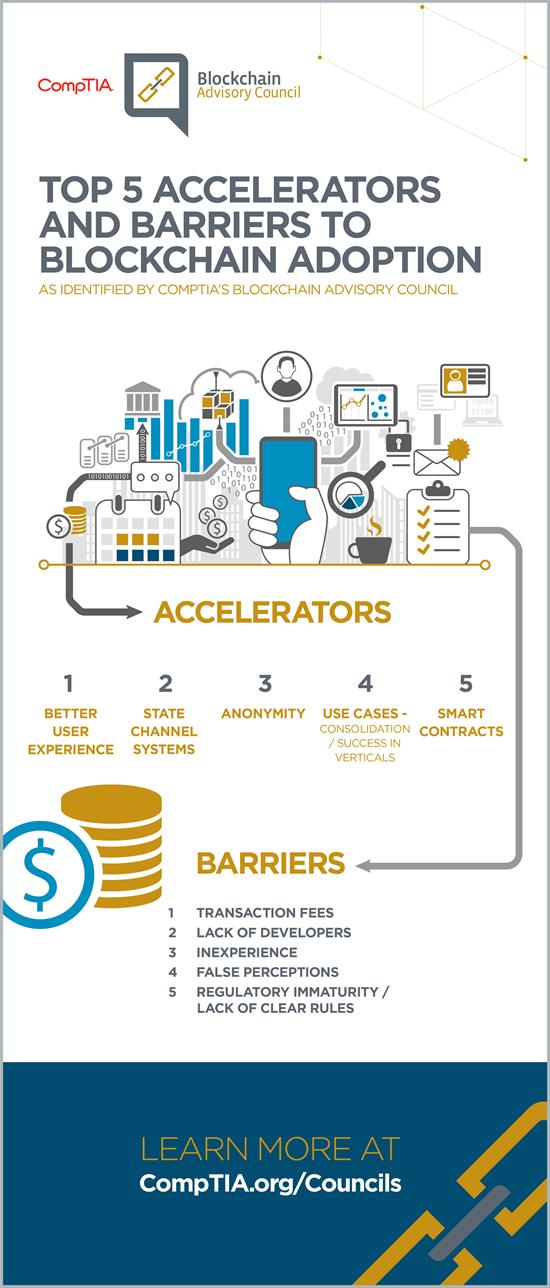There are plenty of reasons for solution providers to get excited about blockchain, but there’s also a lot to do before most can develop successful practices, according to members of CompTIA’s Blockchain Advisory Council.
Blockchain, most notably associated with cryptocurrencies such as Bitcoin, uses an open, distributed ledger of data that permanently records transactions through cryptography, timestamps and transactional data—all meant to prevent alteration of the data. But that’s just scratching the surface, according to Jim Gitney, CEO of Group50, an Upland, Calif.-based solution provider and co-chair of CompTIA’s Blockchain Advisory Council.
There are almost limitless possibilities for leveraging blockchain in any industry and any environment, Gitney said. “Many governments around the world recognize blockchain as the most reliable way to document land titles, corporate filings, health care records, transactions and many other things,” he said. “Blockchain is the next generation of the internet. Right now, it’s probably where the internet was in 1996 or 1997. There’s a lot we can do now but there’s a lot that is aspirational too.”
To highlight the opportunities, as well as the challenges, the Blockchain Advisory Council has identified five accelerators and five barriers to blockchain adoption (detailed in the infographic at right). The goal of the infographic—and the council itself—is to evangelize blockchain as a disruptive technology that will impact how business is done in the future, Gitney said. The faster solution providers understand blockchain and its implications for business, the more innovative solutions they can create and bring to market, he said.
For example, Group50 is talking with a company in the firearms industry, where establishing a true chain of custody is incredibly important, Gitney said. Blockchain will do that. “We want to be on the forefront with this. It will impact so much of everything we do. Since we’ve gotten involved in blockchain and IoT, our supply chain business has doubled because we’re able to talk about blockchain, which helps us get recognized as subject-matter experts.”
Use Cases, Smart Contracts Will Spur Adoption
Blockchain is a tool that facilitates “disruption innovation” which, once understood, has almost universal application possibilities, said Neeraj Satija, a co-chair of CompTIA’s Blockchain Advisory Council and CEO/CTO at Concordus Applications, a Roseville, Calif.-based company.
Satija realized the implications for blockchain while researching a problem his organization had paying commissions to agents. Namely, the company was issuing a large number of service tickets around commission payments, more than any other area, Satija said. The issue affected employee productivity and impacted the whole business.
The company implemented smart contracts using blockchain, which dramatically reduced the number of service tickets and improved communication and payments between involved parties. “Whenever there’s a dispute or disconnect between payers and recipients, it can create bad blood. Nobody wants that,” he said. “Blockchain was a godsend for helping us fix that scenario.”
As solution providers identify more use cases like his own experience, Satija expects blockchain adoption to accelerate.
“Blockchain leads to profound business workflow change for the better,” he said. “You’re doing away with contracts, paper trails; you’re doing away with all those activities in a workflow that don’t need a third party or manual intervention. I realized that purely from my own use case, there’s strong need for blockchain that can be applied in a number of environments.”
Lack of Standards, Skills Shortage Can Impact Adoption
Of course, what we know as blockchain today will likely look much different in the not-too-distant future. The technology is still developing, skilled resources are hard to find, and there’s not a lot of clear standards or regulations in place—all of which might impact adoption for a while.
“Companies are reticent to jump on blockchain because it’s too immature at this point,” Gitney said. “For solution providers, the focus needs to be on standardization and developing a great story. We’re probably four or five years away from seeing blockchain as mainstream, but it will come.”
Companies have spent so much money on their technology infrastructure, it will be difficult to get them to redefine and redesign around blockchain, Gitney said. “You need to take an incremental approach and focus on businesses that need to have a full chain of custody and provenance for compliance. These companies will realize a fast ROI.”
Another obstacle for blockchain adoption is a dearth of developers, but also skilled resources that understand how the technology fits into business, said Satija. “Right now, it’s a specialized, niche area. It’s very different from most other web technologies. But it’s more than technology. It’s business processes and process workflows,” he said. “This is not putting up a website or an accounting system only used by accountants. It’s a paradigm shift and we need an entire community of people that know the functional requirements really well.”
Start the Conversation Now
Overall, it’s a matter of when, not if, blockchain reaches critical mass in the market, executives said. During this maturation phase, it’s important for solution providers to learn the subject matter and start conversations with customers in order to establish themselves at thought leaders now, according to Annette Taber, CompTIA’s vice president of industry outreach.
“Blockchain will change the way we do business—and what we expect from business,” Taber said. “The CompTIA Blockchain Advisory Council is tasked with raising awareness of this important technology and providing solution providers with the information and tools necessary to prepare their businesses for blockchain. They may not start selling blockchain today, or tomorrow, but it’s going to be a part of their future.”
Even if blockchain is not a 100% match for your business right now, you can slice and dice, and take components of it that you can find a use for now, Satija said. “For example, smart contracts. Embrace them to differentiate yourself,” he said. It’s more than a first-mover advantage, it’s a chance to disrupt how businesses run.”
Don’t try to sell blockchain as technology, Gitney said. Instead, create a unique, innovative way to use the technology and market that. “Ask yourself, does this solve a real problem that cost companies a lot of money or impacts people’s lives? If you can demonstrate that, you’re on your way.”


 Add CompTIA to your favorite RSS reader
Add CompTIA to your favorite RSS reader

